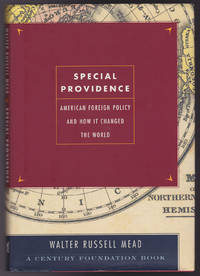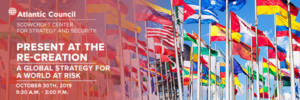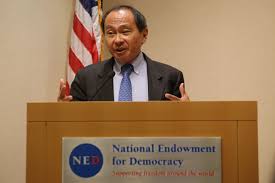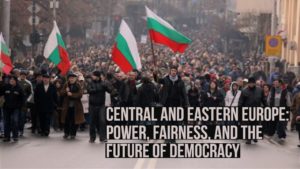Defending and advancing democracy is “the cause of our time,” says Damon Wilson, President & CEO of the National Endowment for Democracy (NED).
Democracy has taken hits or is on the defensive with coups in Burma and Guinea, manipulated elections in Nicaragua and Russia, and suppressed protests in Belarus and Cuba. And yet from Moldova to Zambia, democrats are demonstrating resilience and resolution, and the NED exists to provide moral and material support to their struggles, he adds.
But democracy assistance groups are likely to find themselves operating in a new strategic context, says a leading analyst.
The U.S. foreign policy establishment still believes that the post-Cold War grand strategy to build a liberal international order by promoting free trade and secular democratic governance not only offers the best way to secure American interests, but represents humanity’s best hope to survive, notes Bard College professor Walter Russell Mead, author of Special Providence: American Foreign Policy and How It Changed the World. Yet two alternative visions of American grand strategy are gaining prominence in U.S. politics as globalism fades, he writes for The Wall Street Journal:
-
 Restrainers, who include both progressives and conservatives, want to reduce America’s footprint abroad. As the U.S. withdraws from its global commitments, restrainers believe a natural balance of power will emerge, with American allies from Europe to Asia taking responsibility for their own defense.
Restrainers, who include both progressives and conservatives, want to reduce America’s footprint abroad. As the U.S. withdraws from its global commitments, restrainers believe a natural balance of power will emerge, with American allies from Europe to Asia taking responsibility for their own defense. - On the other hand, global nationalists—mostly more hawkish Republicans and independents—have little regard for global multilateral institutions, free trade and visionary human rights goals, but believe that U.S. security requires an active American presence in key theaters around the world.
Under the circumstances, the old consensus in support of a global liberal order seems fated to fade even as geopolitical challenges such as a rising China and global problems like climate change grow, Mead concludes.
The idea that the United States is uniquely qualified to reshape the world has manifested itself in different ways in the 30 years since the collapse of the Soviet Union marked the end of a bipolar world, argues Emma Ashford, a Senior Fellow at the New American Engagement Initiative at the Atlantic Council’s Scowcroft Center for Strategy and Security. Humanitarian intervention, democracy promotion, and counterterrorism—all were attempts to mold the world according to American preferences. Yet the unipolar moment has largely failed to live up to expectations. Today, opinion is increasingly coalescing around three distinct views, she writes for Foreign Affairs:
 The first of these is a modified form of liberal internationalism, the school of thought that believes that U.S. leadership is a stabilizing force in the world, emphasizes militarized deterrence, and has faith in a liberal, rules-based international order. Proponents of this approach often frame threats from China and Russia as threats to this order rather than as threats to concrete U.S. security interests….. The scholars Mira Rapp-Hooper and Rebecca Lissner—both of whom now serve on the National Security Council—belong to this camp. As they wrote in these pages in 2019, “Rather than wasting its still considerable power on quixotic bids to restore the liberal order or remake the world in its own image, the United States should focus on what it can realistically achieve.”
The first of these is a modified form of liberal internationalism, the school of thought that believes that U.S. leadership is a stabilizing force in the world, emphasizes militarized deterrence, and has faith in a liberal, rules-based international order. Proponents of this approach often frame threats from China and Russia as threats to this order rather than as threats to concrete U.S. security interests….. The scholars Mira Rapp-Hooper and Rebecca Lissner—both of whom now serve on the National Security Council—belong to this camp. As they wrote in these pages in 2019, “Rather than wasting its still considerable power on quixotic bids to restore the liberal order or remake the world in its own image, the United States should focus on what it can realistically achieve.”- Another alternative has percolated out of the synthesis of the Republican foreign policy establishment and the Trump administration: a form of belligerent unilateralism that prioritizes maintaining U.S. military primacy. … They have therefore shifted from democracy promotion and nation building toward a militarized global presence more akin to classic imperial policing…. As [NED board member] Nadia Schadlow, a veteran of the Trump White House, wrote in these pages in 2020, “Washington must let go of old illusions, move past the myths of liberal internationalism, and reconsider its views about the nature of the world order.”
 The remaining alternative, restraint, comes from outside the Washington policymaking world…. It is far more ideologically diverse than the other two, but most restrainers agree on several core principles. They share a conviction that the United States is a remarkably secure nation, that unlike many great powers in history, it faces no real threat of invasion, thanks to geography and nuclear weapons. They argue that U.S. foreign policy has been characterized in recent years by overreach and hubris, with predictably abysmal results. And they think U.S. foreign policy is overmilitarized, with policymakers spending too much on defense and too quickly resorting to force. Most important, advocates of restraint strike directly at the notion of the United States as the indispensable nation, considering it instead as but one among many global powers.
The remaining alternative, restraint, comes from outside the Washington policymaking world…. It is far more ideologically diverse than the other two, but most restrainers agree on several core principles. They share a conviction that the United States is a remarkably secure nation, that unlike many great powers in history, it faces no real threat of invasion, thanks to geography and nuclear weapons. They argue that U.S. foreign policy has been characterized in recent years by overreach and hubris, with predictably abysmal results. And they think U.S. foreign policy is overmilitarized, with policymakers spending too much on defense and too quickly resorting to force. Most important, advocates of restraint strike directly at the notion of the United States as the indispensable nation, considering it instead as but one among many global powers.
But ideological cleavages do not preclude practical cooperation on certain issues, Ashford suggests.
“Offshore balancers might choose to work with America firsters on reining in democracy promotion and nation building,” she writes. “Progressives might make common cause with liberal internationalists on fighting kleptocracy or bolstering the role of multilateralism and diplomacy.”

Former NED board member Francis Fukuyama
Democracy advocates must also contend with the difficult legacies of the post-9/11 era, says a prominent observer.
The long-term consequences of the American overreaction to the September 11 attacks have been dire, argues Stanford University’s Francis Fukuyama. The effort to justify the Iraq invasion as a case of democracy promotion tainted the very idea of democracy in the eyes of many around the world, he writes for American Purpose.
Democracy is also threatened by left- and right-wing versions of populism, adds Henry Olsen, a senior fellow at the Ethics and Public Policy Center. The entire developed world is experiencing the end of the stable party systems built to answer the political questions posed by the ends of the Second World War and the Cold War. New political questions always lead to new political coalitions, and neither the United States nor the rest of the world is nearing the end of this global political realignment, he writes for the Washington Post.
 Strengthening democratic resilience in East-Central Europe (ECE) starts with a proper diagnostic of local capabilities and vulnerabilities, argues analyst Clara Volintiru. Better, more comprehensive datasets at local level should be developed by national authorities and international organizations, she writes in a new paper for the German Marshall Fund:
Strengthening democratic resilience in East-Central Europe (ECE) starts with a proper diagnostic of local capabilities and vulnerabilities, argues analyst Clara Volintiru. Better, more comprehensive datasets at local level should be developed by national authorities and international organizations, she writes in a new paper for the German Marshall Fund:
- Local governments’ capacity is linked to resources and boosting their budgetary fiscal sustainability can help address some of the constraints ECE local governments face and strengthen democratic accountability.
- Connecting ECE cities within larger international cities’ networks can also contribute to the exchange of good practices and strengthening local capacities.
- Finally, local communities should engage more with their local governments, and leading CSOs should develop peer-networking, capacity-building programs, and collaborative projects with other local organizations in different ECE cities.
As the mayor of Budapest, a major European city, Gergely Karácsony can attest to the fact that local governance matters, he writes for Project Syndicate. Whether it is through democratic engagement, emissions reductions, or social investment (areas where we have already made significant strides despite fierce resistance from the Orbán regime), local governments are well positioned to improve citizens’ lives. Injustices that alienate people from democracy can be rectified. Channels for democratic dialogue can be restored, he argues in How Democracy Can Win Again.

Hungary will host the Budapest Forum for Building Sustainable Democracies [in partnership with NED grantee Political Capital] this month to convene a wide range of stakeholders, including mayors, European Union officials, activists, and high-profile academics, Karácsony adds.
Hungary’s Prime Minister Viktor Orbán and his Fidesz party have controlled the government since 2010 and made major changes to its structure, Benjamin Wallace-Well writes for The New Yorker:
- First, in 2012, came a new constitution, which increased the number of justices on the Constitutional Court from eleven to fifteen and introduced a new process for selecting them; by 2013, Orbán’s party had chosen nine of them. The new constitution also eliminated election runoffs, allowing Orbán’s party—the largest of a half-dozen in the country—to convert vote totals of forty-four per cent and forty-eight per cent in the past two parliamentary elections into legislative supermajorities.
-

National Endowment for Democracy (NED)
Second has been an extension of political power into cultural spheres, a shift marked first by the strident anti-migrant position Orbán took in 2015 and his statement the previous year that a democracy need not be liberal. The landmark Central European University, founded in 1991 by George Soros, was effectively evicted from Hungary; theatre directors have been replaced by politically compliant figures; the largest newspaper in the country, Népszabadság, was shuttered, with journalists and opposition figures alleging that government pressure was responsible, and owners blaming declining sales.
In its 2020 annual report, Freedom House concluded that these steady incursions against Hungarian freedoms meant that the country no longer met its definition of a democracy, Wallace-Wells adds.
The Consortium for Elections and Political Processes (CEPPS) highlights NDI chair Madeleine Albright on supporting resilient, inclusive democracies.
Secretary @madeleine Albright talks about the importance of supporting resilient and inclusive democracies on the latest episode of Democracy! The #Podcast
Check it out now: https://t.co/W9hxcBTnRn @IRIglobal @NDI @IFES1987 @USAIDDRG pic.twitter.com/4kDKhLO1zg
— CEPPS (@cepps) September 14, 2021
The timely comments of NED’s Damon Wilson come as pro-democracy organizations and activists prepare to mark the International Day of Democracy on September 15.
Ahead of the International Day of Democracy together with our partners and allies, we recognise the important role of democracy for building a future that is safer and stronger for everyone #DemocracyAllies pic.twitter.com/7DnSSegEwD
— CoD (@CommunityofDem) September 14, 2021







